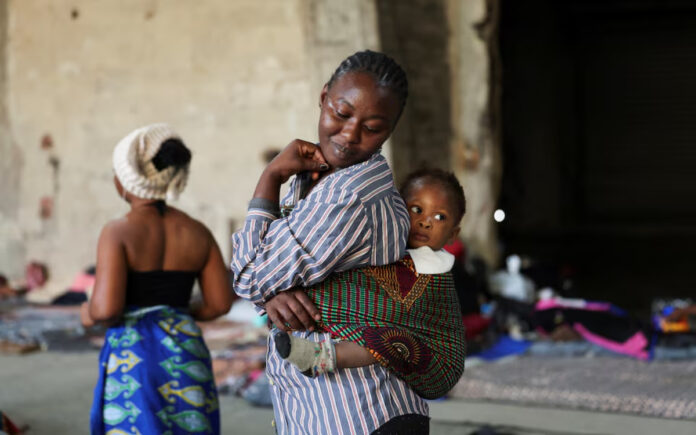Hazmieh: Fajima Kamara, a 28-year-old mother of three from Sierra Leone, came to Lebanon three years ago seeking better opportunities. She had been working as a domestic helper for a Lebanese family in Baalbek, a Hezbollah stronghold. However, her life took a drastic turn when Israeli airstrikes began pounding her neighborhood last month, causing widespread fear and displacement.
As the cross-border conflict between Israel and Hezbollah sharply escalated in late September, Kamara’s employers fled to Dubai for safety, leaving her jobless and homeless. They informed her that she could not stay in their home during their absence and instructed her to find her “fellow African sisters” in Beirut.
With her phone and passport still confiscated by her employers and no time to pack her belongings, Kamara had no choice but to leave Baalbek with nothing but the clothes on her back. She joined thousands of other displaced individuals heading to Beirut, hoping to find a place to stay. Unfortunately, her search for refuge was unsuccessful, as local shelters, overwhelmed by displaced Lebanese families, turned her away.
“I slept on the street for two days. Now I have fever,” Kamara told Reuters, visibly struggling with illness as she recounted her experience.
U.N. officials reported on Friday that Lebanon’s nearly 900 shelters are nearly full, raising alarm for tens of thousands of live-in domestic workers, mostly women, who have been “abandoned” by their employers as the conflict intensifies.
Kamara eventually found refuge in a shelter hastily opened by Lebanese volunteers on October 1. While she now has a temporary place to stay, she remains worried about her future. Her ultimate goal is to find another job in Lebanon to avoid returning home penniless, but her situation remains precarious without access to her passport.
Also Read | Anti-Government Protests Erupt in Hungary Over State Media Control
The shelter Kamara now stays in accommodates about 100 migrant workers and some of their children, providing only basic necessities. Residents sleep on thin cots on a concrete floor and eat off wooden pallets. The volunteers, led by Dea Hage-Chahine, are working tirelessly to expand the shelter by adding power generators and a makeshift kitchen.
“For now, for those who told us they want to travel, we initiated the process. For those who want to stay, for now, we have the shelter open for them, providing any needs they require. But we don’t know what’s next,” Hage-Chahine said.
In a country already weakened by economic crisis and recurring conflict, grassroots initiatives have become vital in providing assistance to the displaced. Lebanese authorities have reported that Israel’s escalated offensive has displaced around 1.2 million people—nearly a quarter of the population—and has resulted in over 2,000 deaths.



